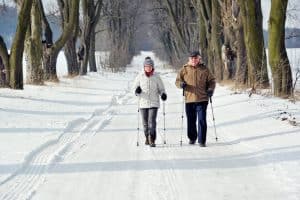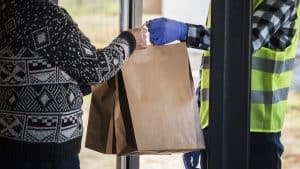
The winter season can be especially dangerous for older adults. Between the snow and ice, chilly temperatures, and the social isolation, it is no wonder why many seniors end up in emergency rooms or their doctor’s office more often in the winter months. Fortunately, you can combat the challenges of winter with just a few of our tips and tricks. Whether it is scheduling your grocery deliveries or enlisting the help of neighbors to help with ice reduction, we have compiled realistic ways you can stay as safe and healthy as possible throughout winter and the rest of the year.
Winter Safety for Seniors: Why It Matters
Winter conditions create more challenges for everyone, but especially seniors. No matter if you love being active or if you prefer to cozy up indoors during the winter season, you should always be aware of the potential health threats that come with winter:
- Extra snow and ice can make outside conditions slippery and treacherous, further increasing the risk of falling.
- According to the Centers for Disease Control and Prevention, older adults make less body heat, which can lead to them feeling colder more often.
- The risk of house fires increases in the winter due to improper use of space heaters.
- Social isolation increases in the winter due to poor weather conditions, and feelings of loneliness have been linked to poor health outcomes.
- Nutrition can suffer due to seniors staying off the winter roads and skipping regular grocery appointments.
- Driving accidents can increase during winter weather events.
Even if you live in a part of the country where you don’t have to worry about frigid temperatures or inches of snow, the winter season can still be challenging. These safety tips and tricks are excellent to remember year round.
Decrease the Risk of Falling

The right gear can reduce your risk of falls while still allowing you to enjoy your favorite winter exercise.
Slips and falls can increase during the winter months thanks to icy sidewalks and snowy driveways. However, falls can also increase indoors due to puddles of water from melting snow and due to wearing cozy slippers that are not skid-resistant. Here are a few tips to decrease your risk of falling in the winter season:
- Choose a pair of cozy slippers that keep your feet warm without making your floors feel slippery. Look for pairs that have a skid-free bottom in order to keep your footing.
- Hire a landscape professional to take care of snow removal on your property for you. This is a wise investment for any older adult, no matter how active or inactive they are. Be sure to find someone who is reliable and who will return after they clear the area to perform ice removal as well. Ask for referrals from friends and neighbors to find a professional that meets your expectations and budget.
- Ask family members or neighbors to help out with ice abatement after a freeze so that you aren’t taken by surprise by a patch of ice on your sidewalk.
- Invest in sturdy boots and consider purchasing ice grippers for increased traction, especially if you love to get out for a walk often.
- If you haven’t already, start researching options for medical alert devices that suit your lifestyle and preferences. This way, help is never too far away.
Staying Warm Safely
Cold temperatures can be especially dangerous for older adults. Unfortunately, the dangers are only compounded when some seniors choose to keep the thermostat low to meet their fixed income budget. Here are a few ways you can safely stay warm this winter:
- If your budget is tight and managing your heating bill seems too challenging, call your city to see how to apply for senior assistance with heating costs. You might even qualify for LIHEAP, or the low income home energy assistance program.
- The National Institute on Aging recommends keeping your home’s thermostat between 68-70 degrees during the winter months. Anything lower can create challenges for your body to stay as warm as it needs to be healthy and safe.
- Steer clear of space heaters, as they are often the culprit that starts most house fires in the winter. If you must use a space heater, ensure the heater is nowhere near objects such as curtains or couches. Further, choose one that has a timer or automatic shut off feature so that it is not running for too long.
- Dress in layers in the house and when running errands outside. Seniors can have difficulty warming up, especially with compounding conditions like diabetes or thyroid issues, and layers give you the option to manage your temperature easier.
Other Winter Safety Tips

Grocery or meal delivery can feel like a splurge, but it is worth it to keep your nutrition on point during the winter.
The winter season can cause delays in regularly scheduled errands or appointments, as well as increased social isolation for older adults. Here are a few tips to combat those challenges:
- Use your city’s senior transportation service when possible, choosing to skip driving if you feel uncomfortable with the road conditions.
- Make phone or video call dates with family or friends throughout the season; put them on your calendar and treat them as the special events they are.
- Talk to your family, friends, or physician if you are feeling especially lonely, depressed, or anxious.
- If you do drive, consider investing in an automatic car starter so that you can safely start your car without even leaving the house. It will be warm and will reduce the amount of ice scraping you need to perform before you even open the door.
- Consider using a grocery delivery service; it can feel like a splurge, but is convenient and safe during the uncertain winter season.
- When you do cook, consider doubling your recipe and freezing individual portions to reheat later.
- Set up delivery for your medications, whether through your pharmacy or by enlisting the help of your family members. This way, you won’t risk being stuck without your prescriptions in case of a storm.
- Double check the battery life of your medical alert device and change your charging habits if needed before a storm.
- If you live in an area where power outages happen frequently due to ice or snow, consider switching your medical alert system to a cellular version, to avoid communication issues due to down landlines, and that have long life backup batteries.
The winter doesn’t have to be dangerous for older adults. Just a few good habits can keep you safe and warm this season.


